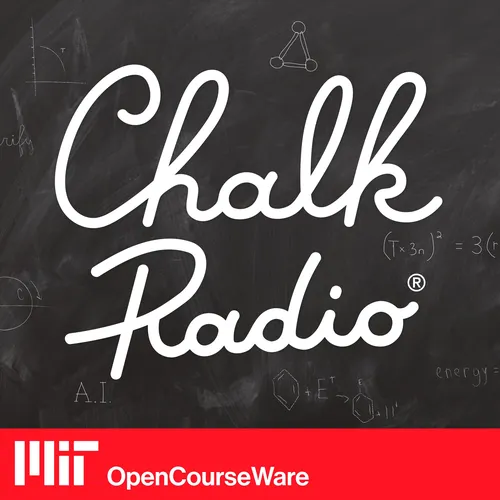
Chalk Radio
Chalk Radio is an MIT OpenCourseWare podcast about inspired teaching at MIT. We take you behind the scenes of some of the most interesting courses on campus to talk with the professors who make those courses possible.
Our guests open up to us about the passions that drive their cutting-edge research and innovative teaching, sharing stories that are candid, funny, serious, personal, and full of insights. Listening in on these conversations is like being right here with us in person under the MIT dome, talking with your favorite professors.
And because each of our guests shares teaching materials on OCW, it's easy to take a deeper dive into the topics that inspire you. If you're an educator, you can make these teaching materials your own because they're all openly-licensed.
Hosted by Dr. Sarah Hansen from MIT Open Learning.
Chalk Radio episodes are offered under a CC BY-NC-SA license (https://creativecommons.org/licenses/by-nc-sa/2.0/).
- Update frequency
- every 15 days
- Average duration
- 21 minutes
- Episodes
- 57
- Years Active
- 2020 - 2025

Sustainability Education Across Learning Environments with Dr. Liz Potter-Nelson and Sarah Meyers
Many people associate the word “sustainability” with a few specific activities such as composting or recycling. Our guests for this episode, Dr. Liz Potter-Nelson and Sarah Meyers, point out that sus…

Teaching Teachers with Dr. Summer Morrill
Nobody comes into this world already knowing how to teach—and most students arrive at undergraduate or graduate programs without any teaching experience at all. For those who are selected to be teach…

Communication is the Whole Game with Paige Bright & Prof. Haynes Miller
In this episode we meet Haynes Miller, Professor Emeritus of Mathematics, who in his 35+ years of active teaching at MIT has done much to shape the institute’s math curriculum. Prof. Miller’s special…

Opening Computer Science to Everyone with Chancellor Eric Grimson
Eric Grimson is MIT’s chancellor for academic advancement and interim vice president for Open Learning; he’s also a longstanding professor of computer science and medical engineering. In this episode…

Seeing Green with Drs. Sandland and Chazot
MIT has long been an innovator in online education. For even longer—for its whole history, in fact—it has championed hands-on learning. These two emphases may seem incompatible, but the MICRO initiat…

Well-being is the Goal with Prof. Frank Schilbach
Do you always make the best possible choices, even when you’re stressed or short on sleep? The ideally rational person (“Homo economicus”) assumed by conventional economics always acts in ways that a…

The Greatest Existential Threat with Prof. Robert Redwine and Dr. Jim Walsh
To most people, especially those who are too young to remember the Cold War, the possibility of nuclear Armageddon may seem so remote as not to be worth contemplating. But Prof. Bob Redwine and Jim W…

Visualizing Calculus with Professor Gigliola Staffilani
Professor Gigliola Staffilani, who teaches in MIT’s Department of Mathematics, was closely involved in designing and teaching the introductory-level 18.01 Calculus I course series now found on the MI…

Finding Expertise Everywhere with Prof. M. Amah Edoh
Though there’s widespread consensus that the slavery and colonization that characterize the history of European relations with Africa represent a legacy of grave injustice, there is much less agreeme…

AI Literacy for All with Prof. Cynthia Breazeal
When humans interact, they don’t just pass information from one to the other; there’s always some relational element, with the participants responding to each other’s emotional cues. Professor Cynthi…

Making Ethical Decisions in Software Design with Prof. Daniel Jackson & Serena Booth
In the previous episode we learned about a project undertaken as part of the Social and Ethical Responsibilities of Computing (SERC) initiative at MIT’s Schwartzman College of Computing. In this epis…

The Human Element in Machine Learning with Prof. Catherine D’Ignazio, Prof. Jacob Andreas & Harini Suresh
When computer science was in its infancy, programmers quickly realized that though computers are astonishingly powerful tools, the results they achieve are only as good as the data you feed into them…

When There Isn't A Simple Answer with Prof. Dennis McLaughlin
Most of the students in Professor Dennis McLaughlin’s course 1.74 Land, Water, Food, and Climate come to it with established opinions on some very controversial topics: whether GMOs are safe, whether…

Learning about Life through Laboratory Chemistry with Drs. John Dolhun & Sarah Hewett
Students in MIT’s course 5.310 Laboratory Chemistry have a state-of-the art lab to work in, with energy-saving hibernating fume hoods and a new spectrometer that achieves mind-blowingly precise measu…

Re-engineering Education with VP for Open Learning Sanjay Sarma
Sanjay Sarma is not only a professor of mechanical engineering; he’s also Vice President for Open Learning at MIT, where he oversees innovative efforts to reimagine education, and he is coauthor (wit…

Sketching a Picture of the Mind with Prof. Nancy Kanwisher
Nancy Kanwisher, founding member of the McGovern Institute for Brain Research and professor in MIT’s Department of Brain and Cognitive Sciences, describes the effort to understand the mind as “the gr…

Prof. Edoh Wants to Know What You Think
Contemporary Movements for Justice is an MIT course in which scholars and activists speak about pursuing justice for European colonialism in Africa and its contemporary legacies.
Do you have ideas th…

Building Our Muscle for Democracy (Prof. Ceasar McDowell)
The classic New England town meeting, with voters gathered in a large hall to decide issues directly, is often cited as the purest form of American democracy. But historically, those town meetings ga…

In Climate Conversations, Empathy is Everything (Brandon Leshchinskiy)
In our previous episode we met Professor Dava Newman, cofounder of the nonprofit group EarthDNA. Today’s guest is Brandon Leshchinskiy, a graduate student in Technology and Policy at MIT’s Institute …

Visualizing the Future of Spaceship Earth (Prof. Dava Newman)
Professor Dava Newman is an aerospace engineer whose career has largely focused on developing improved space suits for eventual interplanetary travel. But in recent years she has turned her sights ba…